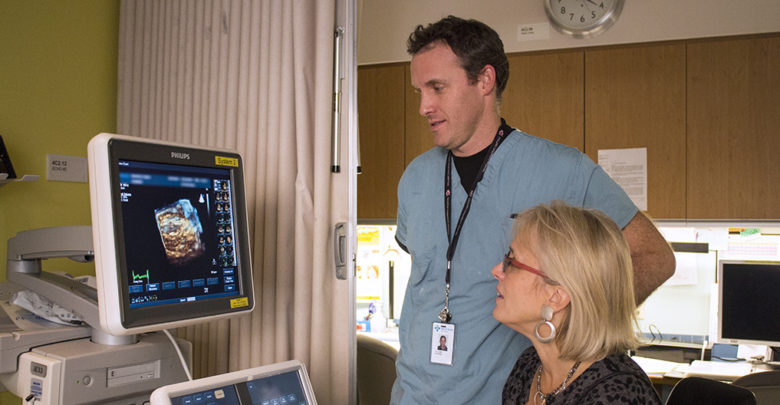 Supplied
SuppliedA pediatric and fetal cardiologist was one of five University of Alberta researchers who received a grant from the Heart & Stroke Foundation of Canada.
Dr. Lisa Hornberger, professor of pediatrics and adjunct professor of obstetrics and gynecology, as well as section head of echocardiography at the Stollery Children’s Hospital and current director of the fetal and neonatal cardiology program, is a recipient of the 2021-2022 Grant-In-Aid program which provides funding for “important, pertinent, novel research in the areas of heart disease and stroke.”
Dr. Hornberger’s research revolves around heart and blood vessel health in pregnant women and how poor health in this area may impact their babies.
“If we understand [how underlying maternal heart conditions can impact their babies], we can ultimately understand who’s at risk and [if] there [are] things that we can do to make sure their babies stay healthy,” Dr. Hornberger said.
Pregnancy and delivery are two times when a mother-to-be’s body undergoes considerable change and the baby has to adapt to these changes. However, if the circulation of blood between the mother and the baby is poor, the baby may not be able to adjust, thus leading to pre-term and small babies.
This does not only refer to women who have identified heart problems; women who may otherwise seem healthy could also experience similar difficulties during pregnancy.
“One of the other factors that made us interested in looking at this is that if you are an otherwise healthy mom, but develop preeclampsia [— high blood pressure during pregnancy —] or have a baby who is born pre-term or small, there is a connection with those moms actually having some underlying vascular health issues,” Dr. Hornberger said.
Fetal cardiology — the study of the heart in babies prior to birth — is a topic near and dear to Dr. Hornberger’s heart. She was first introduced to this area of research as a first-year medical student. Someone who exposed her to this area was her supervisor and mentor Dr. David Sahn, “one of the pioneers in fetal cardiology and pediatric echocardiography.”
“He had shown me what [fetal cardiology] was about and I got really, really excited, not knowing how new things were, but he took me under his wings.”
Continuing with research through medical school, residency and her training as a pediatric cardiologist, Dr. Hornberger was able to shape the field of fetal cardiology into what it is today, and her contributions have not gone unnoticed.
“This year I’m receiving … the Lifetime Achievement Award from the American Society of Echocardiography, our North American society that recognizes contribution to the field, for my work in cardiology,” Dr. Hornberger announced.
“I have to owe it to my former mentor Dr. Sahn… I was very excited and very humbled and honoured.”
She also suggests that anyone with any interest in research to try it.
“I have had a number of undergraduate students … publish and present at national meetings and I think that is when you get the [research] bug,” she said.
But Dr. Hornberger does not only enjoy treating patients and changing the lives of the next generation.
“I am one of the vocalists for a jazz band … the Baby Blue Sound Collective … that is made up of pediatric cardiologists, cardiac surgeons, and cardiac anesthesiologists,“ Dr. Hornberger explained.
“It’s a good thing to have extracurriculars when you’re in any field … It helps you stay balanced and enjoy life … It’s important if you’re in medicine especially because if you have to relate to families and patients and not having all of that would make it really difficult to relate to people.”
Before COVID-19, she had the chance to sing internationally, from New York to Australia to Argentina to Buenos Aires. The group has even won a competition.
“It’s good fun and there are professionals who have been friends for many, many years. We all have the same passion for taking care of our patients and most of these guys are very involved in research and are leaders in their fields.”
To students who may still be exploring their future career options, she advised them to “find your passion, something that you could really enjoy — don’t settle.”
“I found mine and I wouldn’t change my career at all and that’s now more than thirty years.”




